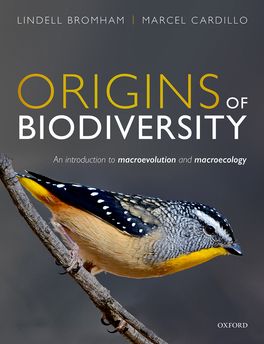Origins of Biodiversity

Origins of Biodiversity
|
ISBN: |
9780199608713 |
|
Binding: |
Paperback |
|
Published: |
2 May 2019 |
|
Availability: |
17
|
|
Series: |
$73.95 AUD
$85.99 NZD
Add To Cart Request an inspection copyDescription
This book is a unique introduction to the fields of macroevolution and macroecology, taking an enquiry-led approach to exploring the evolution and distribution of biodiversity across time, space and lineages.
The only introduction to macroevolution and macroecology to adopt an innovative enquiry-led, case study-based framework to encourage active learning and critical thinking, this book:
- Extends the study of evolutionary biology and ecology beyond the topics covered in typical undergraduate texts
- Explores the nature of scientific investigation by emphasising hypothesis testing and highlighting the range of analytical tools available to contemporary researchers
- Encourages active student-driven learning by using open questions and current debates to promote critical thinking, identify interesting and important problems, and demonstrate how to frame testable research hypotheses
- Combines these three skills—an understanding of macroevolutionary and macroecological principles and patterns, a grasp of hypothesis testing, and the ability to identify important questions—to allow students to look at the world with new eyes, and develop an understanding of why the biological world is as it is.
This title is available as an eBook. Visit VitalSource for more information or to purchase.
Contents
1: What is macroevolution? What is macroecology?
2: How did evolution get started?
3: Does evolution favour increased size and complexity?
4: What caused the explosion of animal evolution in the Cambrian?
5: Were dinosaurs evolutionary failures?
6: Was the diversification of mammals due to luck?
7: Is sex good for survival?
8: Why are most species small?
9: Why are there so many kinds of beetles?
10: Why are there so many species in the tropics?
11: What is the future of biodiversity?
Authors
Lindell Bromham, Professor in Evolutionary Biology, Macroevolution and Macroecology Group, School of Biology, Australian National University, and Marcel Cardillo, Australian Research Council QEII Fellow, Macroevolution and Macroecology Group, School of Biology, Australian National University
Lindell Bromham's main research focus has been in the application of DNA sequence analysis to investigating evolutionary patterns and processes, applied to a range of questions in evolution, ecology, conservation, genetics, bioinformatics, development, virology, and linguistics. Lindell has taught evolutionary biology at five universities in three countries and has written several undergraduate textbooks; the latest, An Introduction to Molecular Evolution and Phylogenetics, was shortlisted for the Royal Society of Biology Undergraduate Textbook Prize of 2016.
Marcel Cardillo's research focuses on understanding and explaining broad-scale patterns of biodiversity such as latitudinal gradients and biodiversity hotspots, explaining patterns of extinction risk and predicting future loss of biodiversity. Marcel has lectured on topics in macroecology, macroevolution, biogeography, and conservation biology at universities in Australia and the UK.
Lecturer Resources
For registered adopters of the text, the instructor resource website includes:
- Downloadable figures from the textbook to use in lecture presentations and teaching materials
- Outlines for discussion-based tutorials and computer workshops to run in conjunction with a lecture course.
Reviews
"An exceptionally well-written textbook on large-scale evolution and ecology, which engages students by using a problem-based approach to recent controversies and debates." - Dr Peter Bennett, University of Kent
"The treatment of the topics is authoritative and up-to-date, and it is certainly written with modern undergraduates in mind." - Prof Arne Mooers, Simon Fraser University
"This book is well-placed to invigorate the fields of macroevolution and macroecology by filling a gap that will open up the subject to the next generation of budding young scientists." - Dr Kevin Arbuckle, Swansea University
"This book succeeds in being a different sort of textbook: one which helps the students to understand science better by helping them understand the process of knowledge creation." - Dr Richard Field, University of Nottingham